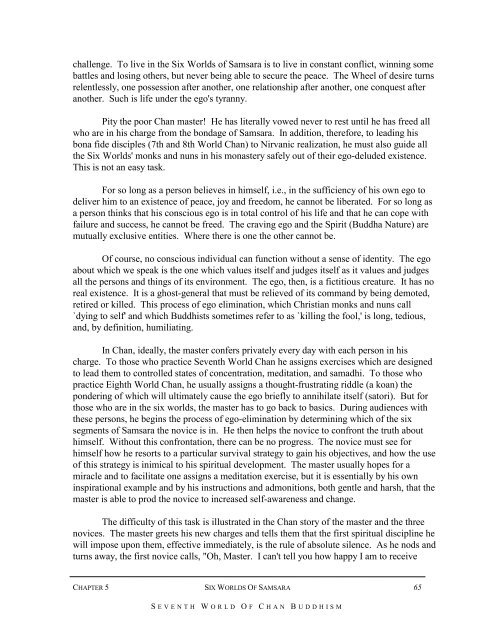seventh world of chan buddhism - Zen Buddhist Order of Hsu Yun
seventh world of chan buddhism - Zen Buddhist Order of Hsu Yun
seventh world of chan buddhism - Zen Buddhist Order of Hsu Yun
You also want an ePaper? Increase the reach of your titles
YUMPU automatically turns print PDFs into web optimized ePapers that Google loves.
challenge. To live in the Six Worlds <strong>of</strong> Samsara is to live in constant conflict, winning some<br />
battles and losing others, but never being able to secure the peace. The Wheel <strong>of</strong> desire turns<br />
relentlessly, one possession after another, one relationship after another, one conquest after<br />
another. Such is life under the ego's tyranny.<br />
Pity the poor Chan master! He has literally vowed never to rest until he has freed all<br />
who are in his charge from the bondage <strong>of</strong> Samsara. In addition, therefore, to leading his<br />
bona fide disciples (7th and 8th World Chan) to Nirvanic realization, he must also guide all<br />
the Six Worlds' monks and nuns in his monastery safely out <strong>of</strong> their ego-deluded existence.<br />
This is not an easy task.<br />
For so long as a person believes in himself, i.e., in the sufficiency <strong>of</strong> his own ego to<br />
deliver him to an existence <strong>of</strong> peace, joy and freedom, he cannot be liberated. For so long as<br />
a person thinks that his conscious ego is in total control <strong>of</strong> his life and that he can cope with<br />
failure and success, he cannot be freed. The craving ego and the Spirit (Buddha Nature) are<br />
mutually exclusive entities. Where there is one the other cannot be.<br />
Of course, no conscious individual can function without a sense <strong>of</strong> identity. The ego<br />
about which we speak is the one which values itself and judges itself as it values and judges<br />
all the persons and things <strong>of</strong> its environment. The ego, then, is a fictitious creature. It has no<br />
real existence. It is a ghost-general that must be relieved <strong>of</strong> its command by being demoted,<br />
retired or killed. This process <strong>of</strong> ego elimination, which Christian monks and nuns call<br />
`dying to self' and which <strong>Buddhist</strong>s sometimes refer to as `killing the fool,' is long, tedious,<br />
and, by definition, humiliating.<br />
In Chan, ideally, the master confers privately every day with each person in his<br />
charge. To those who practice Seventh World Chan he assigns exercises which are designed<br />
to lead them to controlled states <strong>of</strong> concentration, meditation, and samadhi. To those who<br />
practice Eighth World Chan, he usually assigns a thought-frustrating riddle (a koan) the<br />
pondering <strong>of</strong> which will ultimately cause the ego briefly to annihilate itself (satori). But for<br />
those who are in the six <strong>world</strong>s, the master has to go back to basics. During audiences with<br />
these persons, he begins the process <strong>of</strong> ego-elimination by determining which <strong>of</strong> the six<br />
segments <strong>of</strong> Samsara the novice is in. He then helps the novice to confront the truth about<br />
himself. Without this confrontation, there can be no progress. The novice must see for<br />
himself how he resorts to a particular survival strategy to gain his objectives, and how the use<br />
<strong>of</strong> this strategy is inimical to his spiritual development. The master usually hopes for a<br />
miracle and to facilitate one assigns a meditation exercise, but it is essentially by his own<br />
inspirational example and by his instructions and admonitions, both gentle and harsh, that the<br />
master is able to prod the novice to increased self-awareness and <strong>chan</strong>ge.<br />
The difficulty <strong>of</strong> this task is illustrated in the Chan story <strong>of</strong> the master and the three<br />
novices. The master greets his new charges and tells them that the first spiritual discipline he<br />
will impose upon them, effective immediately, is the rule <strong>of</strong> absolute silence. As he nods and<br />
turns away, the first novice calls, "Oh, Master. I can't tell you how happy I am to receive<br />
CHAPTER 5 SIX WORLDS OF SAMSARA<br />
S EVENTH W ORLD O F C HAN B UDDHISM<br />
65


